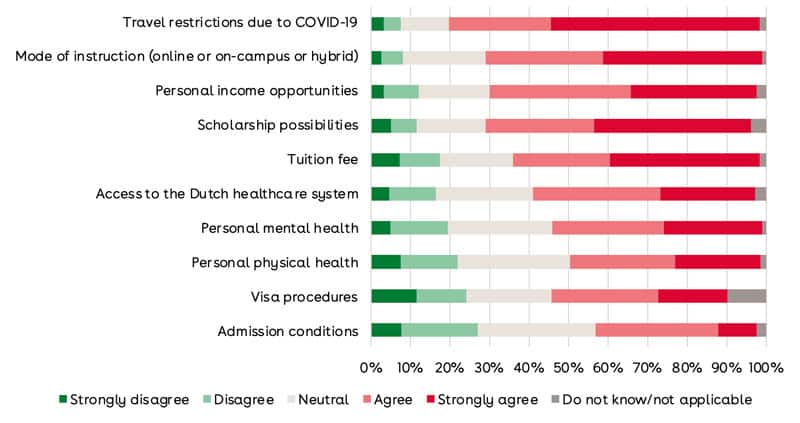Foreign enrolment in the Netherlands stable during COVID but questions remain for coming academic year
- Driven by continuing growth in EEA enrolments, the number of degree-seeking international students in the Netherlands actually grew last year
- Important questions remain, however, about how enrolment will take shape for the 2021/22 academic year
The international student base in Dutch universities has been bolstered by continuing strong enrolment from within the European Economic Area (EEA), even during the pandemic. A recent report from Nuffic, the country's peak body for international education, aims to forecast student demand for Dutch higher education for the coming academic year.
Drawing on the three survey cycles of prospective and incoming students, the most recent of which was completed in March 2021, it finds that student intent is holding steady 2021/22. Nearly three in four responding students say that it is “likely” or “very likely” that they will follow through on their study plans in the Netherlands this year.
Before COVID, there were nearly 86,000 foreign, degree-seeking students in the Netherlands. Students are attracted primarily by the quality of Dutch higher education, the international recognition of Dutch degrees, and the growing number of programmes taught in English.
Most foreign students in the country are drawn from within the EEA, and from Germany, Italy, and Belgium in particular. And international enrolment in Dutch universities actually increased by 13% during the pandemic (as measured year-over-year as at 1 October 2020), and this was largely driven by continuing growth in EEA numbers. Enrolment from outside the EEA (with China, the UK, and India among the top senders) fell off by -4% year-over-year.
The big question now will be whether the pandemic will have a more substantial impact on enrolment in the 2021/22 academic year. In spite of the positive indicators regarding student intent (as noted above), there are some reasons for concern.
First, the Dutch Immigration and Naturalization Service (IND) reports a significant decline in student visa applications [link to https://ind.nl/nieuws/paginas/minder-aanvragen-buitenlandse-studenten-door-corona.aspx] through the first seven months of 2020. The number of applications filed during that period was roughly half the volume of the year before. It is not clear whether those students had simply delayed their applications over those months, or if they had more permanently changed their plans to study in the Netherlands.
Second, almost half (44%) of respondents to the March 2021 Nuffic survey are still considering alternate study destinations for the coming academic year. As Nuffic reports, "Among the respondents who are considering other countries, the United Kingdom is the most popular (27.8% is considering this country). Germany (27.4%) and Australia (20.1%) complete the top three."
The survey results also clearly reflect key areas of concern for students when it comes to planning for their studies this year. "Travel restrictions due to COVID-19" tops the list, followed by questions around whether instruction will be in-person or online for the coming year.

In a related development, the Dutch government announced an accelerated reopening of the country in June, and this has in turn fuelled some optimism for a broader return to in-person instruction later this year. At issue is a 1.5 m distancing rule that, among other things, has meant that only a relatively small number of students could attend university in person.
“We are looking forward to a new academic year without restrictions”, Pieter Duisenberg from the Association of Universities said to NL Times. "The coronavirus crisis has shown that the academic community is present everywhere but above all that social contact is essential for academic education."
The government is due to make a subsequent announcement by 13 August as to whether the 1.5 m rule will remain in place for the coming school year.
For additional background, please see:
















